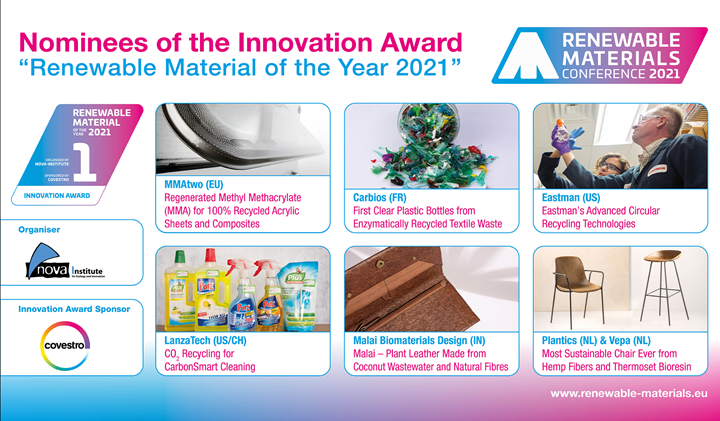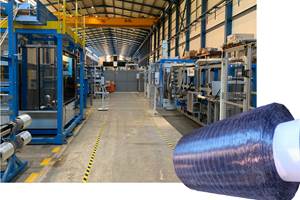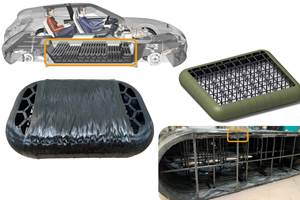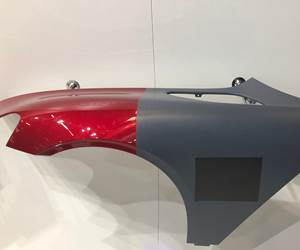Advanced biocomposite technologies nominated for “Renewable Material of the Year” Innovation Award
Six nominees chosen for Renewable Materials Conference award, including India-based Malai Biomaterials Design for its plant leather biocomposite, and Netherlands-based Vepa and Plantics’ hemp chair.

Six nominees for the Renewable Material of the Year Innovation Award. Photo Credit: Renewable Materials Conference
The Renewable Materials Conference 2021, the follow-up event to the 13th International Conference on Bio-based Materials, announced on April 29 the six nominees chosen by its advisory board for its “Renewable Material of the Year” Innovation Award. The comprehensive award, sponsored by Covestro (Leverkusen, Germany), looks for brand new applications that aim to avoid or substitute fossil-based virgin materials (produced either from biomass, directly via CO2, utilization or recycling) and are either already on the market, or will be in the near future.
Nominated out of 36 submissions, two in particular, Malai Biomaterials Design (Kerala, India) and Dutch furniture manufacturer Vepa (Hoogeveen, Netherlands) and Plantics (Netherlands), apply composites; all nominees will present their new technologies and applications at the May 18-20 online event. The award winners will be chosen by the conference participants online on the second day of the conference.
Malai Biomaterials Design uses malai, a novel biocomposite material based on bacterial cellulose cultivated on wastewater from mature coconuts blended with fibers from banana stem, hemp and sisal. It is made without any oil-based or toxic substances, is bio-based and home compostable. Similar to leather in its properties and appearance, the material is used for accessories such as bags and purses. The company works with wastewater from coconut processing plants in Southern India. A small coconut plant disposes of about 4,000 liters of this water per day. Such wastewater is usually discharged into the environment, where it acidifies the soil. Malai collects and sterilizes the water, which can then be used as feed for the bacteria. This bacterium produces nano-cellulose sheets, which are further enriched with natural fibers to obtain the final material.
Dutch furniture manufacturer Vepa is said to be the first in the world to launch a collection of chairs with a shell of a biomaterial made of hemp fiber and bioresin. Both are fully biological, plant-based and recyclable. Vepa says the bio-based resin and material are part of a new family of bio-based materials that has been developed by Plantics and is patented worldwide for many different applications. Plantics and Vepa collaborated intensively for two years to turn the biomaterial into a high-quality seat shell. The collection is produced entirely in the Netherlands and currently includes chairs and bar stools. The production process absorbs more CO2 than it emits. In addition, the chairs are designed in such a way that the various parts are easy to separate and materials can reportedly be reused endlessly.
The four additional nominees include:
- EU-funded project, MMAtwo, which obtains new polymers from regenerated methyl methacrylate (MMA) for 100% recycled acrylic sheets and composites.
- Carbios (France), which claims to be the first company that has developed biological processes to revolutionize the end-of-life of plastics and textiles. The enzymatic recycling technology reportedly deconstructs any type of PET plastic waste into its basic components (monomers) which can then be reused to produce new PET plastics of virgin quality.
- Eastman Chemical Co. (Kingsport, Tenn., U.S.), with new molecular recycling technologies that break down plastic waste into molecular building blocks and rebuild them into new materials like carpets and textiles, for a complete circular solution.
- A launched a range of liquid cleaning products containing LanzaTech (Skokie, Ill., U.S.) CarbonSmart Ethanol as part of Migros (Zurich) Plus Oeco Power and Potz cleaning ranges. The CarbonSmart Ethanol is produced from recycled carbon from steel emissions.
The “Renewable Material of the Year” innovation award is sponsored by Covestro. Neste, Sorona, SUGAR ENERGY and UPM support the conference as Gold Sponsors, Alfa Laval, FKuR, MMAtwo, Photanol/Renolit as Silver Sponsors and LanzaTech as a Bronze Sponsor.
Related Content
Novel dry tape for liquid molded composites
MTorres seeks to enable next-gen aircraft and open new markets for composites with low-cost, high-permeability tapes and versatile, high-speed production lines.
Read MoreCombining multifunctional thermoplastic composites, additive manufacturing for next-gen airframe structures
The DOMMINIO project combines AFP with 3D printed gyroid cores, embedded SHM sensors and smart materials for induction-driven disassembly of parts at end of life.
Read MoreTU Munich develops cuboidal conformable tanks using carbon fiber composites for increased hydrogen storage
Flat tank enabling standard platform for BEV and FCEV uses thermoplastic and thermoset composites, overwrapped skeleton design in pursuit of 25% more H2 storage.
Read MoreThe state of recycled carbon fiber
As the need for carbon fiber rises, can recycling fill the gap?
Read MoreRead Next
VIDEO: High-rate composites production for aerospace
Westlake Epoxy’s process on display at CAMX 2024 reduces cycle time from hours to just 15 minutes.
Read MoreCFRP planing head: 50% less mass, 1.5 times faster rotation
Novel, modular design minimizes weight for high-precision cutting tools with faster production speeds.
Read More“Structured air” TPS safeguards composite structures
Powered by an 85% air/15% pure polyimide aerogel, Blueshift’s novel material system protects structures during transient thermal events from -200°C to beyond 2400°C for rockets, battery boxes and more.
Read More













.jpg;maxWidth=300;quality=90)











